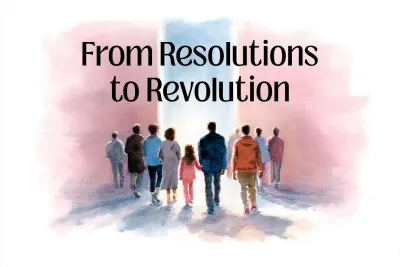The Hardness and the Healing
For the past several weeks, our journey in Created in the Image of God has been one of feeling—raw and unfiltered. We’ve grieved lost siblings, reflected on prodigal wanderings and family fracture, and celebrated the outpouring of grace when the Father runs to meet us while we are still a long way off. Through it all, we are confronted with the profound truth that God is not just our Father, but the first and ultimate Father of every child—reminding us that those we call our own, whether by blood or by circumstance, are ultimately His. Our role—as parents, mentors, or simply caring adults—is to love, nurture, and steward these souls for the time they are entrusted to us, with humility and joy. This week, in conversation with Debbie Ausburn, we deepened that awareness, exploring not only what it means to raise those born to us, but the sacred challenge and privilege of walking alongside “other people’s children”—and recognizing, in the end, that all of them are God’s.
Debbie brought a lifetime of wisdom to this challenge: as a lawyer, a stepmother, a foster parent, and a seasoned guide through the arena where good-heartedness meets hard reality. Her life is a living testimony to the power of love to rebuild what’s broken. Yet as we talked, a deeper pattern emerged—one that threads through my own life, ministry, and writing: the endless, sometimes exhausting, dance between compassion and clear moral vision.
It’s become fashionable in our culture to default to “bleeding heart liberalism”—to insist there is always more we could give, more we must forgive. When confronted with the wounds that fracture the family—abuse, abandonment, addiction—our instinct is to forgive, to embrace, to heal. And so it should be; there is nothing more Christlike than leaving the ninety-nine to seek the one.
But as I wrote in The Hardness of the Heart, and as I taught (sometimes to the pain of those listening) when I was a minister: Jesus, when tested by the Pharisees about divorce, cut to the heart of the matter. Yes, Moses allowed divorce—but only “because of the hardness of your hearts. But from the beginning it was not so.” (Matthew 19:8). The ideal—one flesh, an unbreakable bond, families that heal across generations—is inviolable, even if reality so often falls short.
The tension is real. Lose yourself too fully in sentimental compassion and you risk losing sight of the standard, the vision, the goal line itself. Settle only for “clear-minded conservatism”—rules, consequences, boundaries—and you risk a hardness that can fracture the very ones you seek to protect. The challenge is to walk the razor’s edge: to persist in love, even as we name and resist what would destroy, to be both a sanctuary and a sentry.
Debbie and I found ourselves circling around the old phrase, “hate the sin, love the sinner”—a statement that has fallen on hard times in an era where the very idea of “sin” is seen as judgmental, even obsolete. But as I argued in The Hardness of the Heart, and as Debbie’s legal and personal experience so often affirms: you can’t navigate the perils of family, foster care, step-parenting, or society if you pretend that missing the mark isn’t real. If everything is permitted, nothing is sacred. If there’s no goal line, we can enjoy a picnic at midfield, and forget that, in many ways, the world is sliding further down a slippery slope – away from wholeness.
Compassion without boundaries leaves those most vulnerable—usually children—at risk. Boundaries without compassion can turn our hearts to stone. There is a reason, as Jesus warned, that Moses allowed for divorce: because without that concession, people’s hardened hearts would corrupt the very institution marriage was meant to uphold. But the ideal—the good, the true, the beautiful—matters, even if the best we can do is aim at it, confess when we miss, and then love our way back to the fight.
This episode—like so much of this season—reminded me that civilization itself hangs in this balance. We need those willing to risk their hearts, their stability, even their reputation to step into the breach for children who aren’t “ours.” Yet we also need moral clarity; we must dare to teach, and sometimes to enforce, that some things are simply wrong—that God, as it is written, hates divorce, not because he loves rules but because he loves children, families, hope and the future.
Debbie’s willingness to work in the mess—never yielding the ideal, but always walking beside those who stumble—is, perhaps, the best model we can offer for “raising other people’s children.” It is the work of civilization—the work of fathers, mothers, and every temporary guardian who picks up the task, even when it costs.
If you’re seeking the “origin of Western civilization,” it is here: in the wrestling match between softness and steel, in the readiness to serve and the wisdom to hold firm, in the humility to admit we are all at risk—and all required to grow.
May we continue to hold that balance: not just talking about how we feel, but remembering where—and what—the goal line is.
And a word about what’s next:
Next week, we dig into pop culture’s most subversive, paradoxical family—the Simpsons. For decades, this show has both lampooned and, in some of its finest moments, buttressed the very ideals I’ve been advocating here. Sometimes The Simpsons seemed to degrade commitment, tradition, and even parental virtue, but again and again it found ways to illuminate what’s right, even while showing us—often hilariously—just how far short we all fall of the mark.
We’ll be joined by Brian Rosman, creator of the famous “Counting the Homer” Homer Calendar (homercalendar.net)—a uniquely Jewish take on counting the omer, using everyone’s favorite donut-loving animated antihero. We’ll explore how this irreverent show, and Brian’s calendar, teach us about sanctifying time, family, tradition, and imperfection—sometimes all at once.
Don’t miss this unique conversation: part pop-culture tour, part spiritual reckoning, and part celebration of the folly and faith that makes us human. Visit homercalendar.net, follow @CountTheHomer on Instagram and @homercalendar on Facebook, and join us for a sneak peek at a perfectly imperfect Springfield.
If these conversations stir you, please subscribe, share, or become a paid subscriber—so that these vital, sometimes uncomfortable, but necessary dialogues can continue reaching those who need them most.






